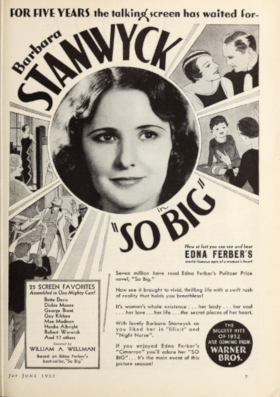Mary McCusker (MM-92-008)

Screenland magazine, Inc., Public domain, via Wikimedia Commons
In 1992, Mary McCusker responded to a media request for contacts from cinemagoers of the 1930s, and was invited to a screening and discussion of popular cinema in the 1930s held at Glasgow Film Theatre in December of that year. She was unable to attend, but submitted notes of, and a published essay on, her early cinemagoing memories; and also made a personal visit to the Project Director's Office. Mrs McCusker subsequently joined Cinema Culture in 1930s Britain's seventeen Glasgow-based core informants, and was interviewed at her home in Cowcaddens, Glasgow on 22 November and again on 13 December 1994. In June 1996, along with several other Glasgow interviewees, she visited CCINTB's exhibition at the Screen Studies Conference at Strathclyde University.
Born in 1916 in the Gorbals, Glasgow, Mrs McCusker was the only child of Irish parents. Her father's jobs included barman and furnace worker, and her mother was a housewife. On leaving school at fourteen she took a job as cashier in a grocery, and subsequently worked as manager of a grocery store until her marriage in 1939. In her first interview, Mrs McCusker shares vivid recollections of the cinemas that she attended in her early years in the Gorbals ("You could walk to them all"), recalling the names and details of many other cinemas in Glasgow and of some of the films she saw in them in later years: over thirty of the city's cinemas are described in the course of the interview. She offers lively memories of her childhood picturegoing, recalling the first talking picture she ever saw, and hearing news of the 1929 Paisley cinema fire. She relives her delight at the later arrival of colour films and CinemaScope, and talks about going to cinemas and dance halls when courting her future husband. She recalls a couple of occasions when she went to dance halls when still very young--and feeling very much out of her depth. She evokes children's matinees, reciting Edith Little's poem 'Saturday Matinee', mentioning the practice of tendering jam jars instead of money for admission, and recalling her own enjoyment of serials and action films. She admires the 1938 film annual brought along by the interviewer: leafing through the book triggers facts and gossip about numerous film personalities (over eighty stars are named during the interview), as well as memories of reading about stars in magazines, etc. She notes her own and her husband's film preferences, and tells a story about the couple seeing an 'arty crafty' film at La Scala that did not meet their preferences at all--and complaining to the manager. The interview draws to a close with memories of copying star fashions and hairstyles, and of the glamour of Glasgow's ballrooms, which inspired their patrons to take dancing lessons and dress up in style for an evening of dancing.Documents, Memorabilia and Related Links
Glasgow home pageScan of Letter (MM-92-008PL002) | Transcript
Scan of Newspaper Article (MM-92-008AR001) | Transcript
Scan of Letter (MM-92-008PL004) | Transcript
'Saturday Matinee' poem by Edith Little (MM-92-008AT015) | Transcript
The Paragon, Glasgow (cinematreasures.org)
The Mystery of Dr Fu Manchu (1923) (YouTube)
The Clothing Aspect (News & Blog area)
'Terrible waste of a brain!' (News & Blog area)
Publication drawn on by Mrs McCusker in her interview:
When Sixpence Was a Fortune: Poems by Edith Little for Concerts and Recitations. Glasgow, Heatherbank Press, 1978